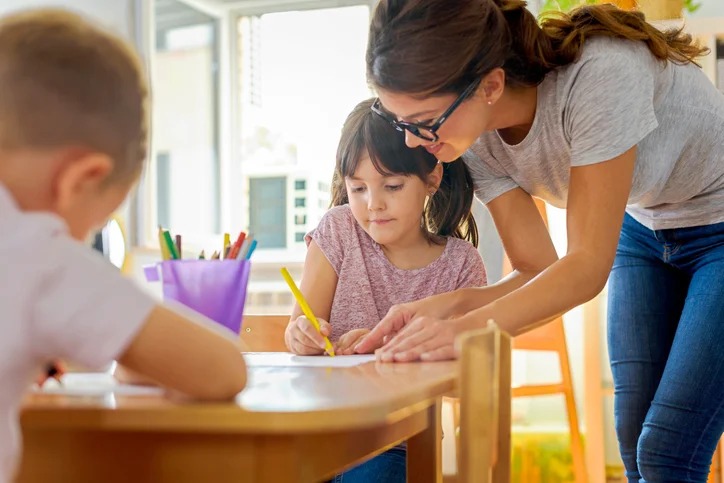What is a Kindergarten Teacher?

A kindergarten teacher specializes in educating young children, typically ages five to six, by laying the groundwork for their academic and social development. These educators create a positive and engaging learning environment that encourages exploration and the development of cognitive, motor, and social skills.
Role and Responsibilities
Duties and Responsibilities Kindergarten teachers are essential for the early development of children, providing a foundation for future academic success and social-emotional growth. Their responsibilities typically include:
- Curriculum Planning: Design and implement age-appropriate lesson plans that align with educational standards and meet the developmental needs of young children. This includes activities that promote cognitive, social, emotional, and motor skill development.
- Classroom Management: Establish a positive and organized learning environment, using effective strategies to encourage cooperation and community among students.
- Instruction and Assessment: Deliver engaging lessons covering subjects like language arts, mathematics, science, and social studies. Assess student progress through observation and informal assessments.
- Individualized Support: Recognize and address the diverse needs of students, providing additional support or challenges as necessary. Collaborate with special education professionals for students with diverse learning needs.
- Parent Communication: Maintain regular communication with parents or guardians about their child’s progress and concerns, conducting parent-teacher conferences to discuss development.
- Early Literacy and Numeracy Development: Promote a love for reading and math through activities that foster pre-reading and pre-math skills, introducing foundational concepts like letter recognition and counting.
- Social and Emotional Learning: Create opportunities for social interaction and emotional development, teaching conflict resolution skills and encouraging empathy.
- Safety and Well-being: Ensure the physical and emotional safety of students by supervising activities and addressing health or safety concerns promptly.
- Professional Development: Stay updated with best practices in early childhood education through workshops, conferences, and training sessions.
- Collaboration with Colleagues: Work with other educators and support staff to create a cohesive learning environment, sharing ideas and resources to enhance student experiences.
Types of Kindergarten Teachers
The role of a kindergarten teacher can vary based on different factors. Here are some common types:
- Traditional Kindergarten Teacher: Follows a conventional curriculum covering reading, writing, math, and science while incorporating play-based learning.
- Special Education Kindergarten Teacher: Works with children who have special learning needs, adapting methods and materials to accommodate diverse abilities.
- Bilingual or ESL Kindergarten Teacher: Focuses on teaching English language learners, enhancing language development and literacy skills in both English and the students’ native language.
- Montessori Kindergarten Teacher: Implements the Montessori philosophy, emphasizing self-directed learning and hands-on activities.
- Reggio Emilia Kindergarten Teacher: Adopts the Reggio Emilia approach, emphasizing child-directed learning and project-based activities.
- STEAM or STEM Kindergarten Teacher: Integrates science, technology, engineering, arts, and mathematics into the curriculum, promoting inquiry-based learning.
- Outdoor Education Kindergarten Teacher: Focuses on nature-based learning, incorporating outdoor activities and environmental education.
- Technology Integration Kindergarten Teacher: Utilizes technology to enhance learning through educational apps and interactive resources.
- Play-Based Learning Kindergarten Teacher: Emphasizes play as a critical component of early childhood development, using games and hands-on activities.
- Inclusion Kindergarten Teacher: Supports students with and without disabilities in an inclusive classroom, fostering collaboration and a sense of belonging.
In summary, kindergarten teachers play a vital role in shaping young children’s educational experiences, laying the groundwork for their future learning and development.
Information provided by CareerOnlines, LLC and other sources.
Sections of this page includes information from the O*NET 29.0 Database by the U.S. Department of Labor, Employment and Training Administration (USDOL/ETA). Used under the CC BY 4.0 license.
CareerOnlines, LLC has modified all or some of this information. USDOL/ETA has not approved, endorsed, or tested these modifications.